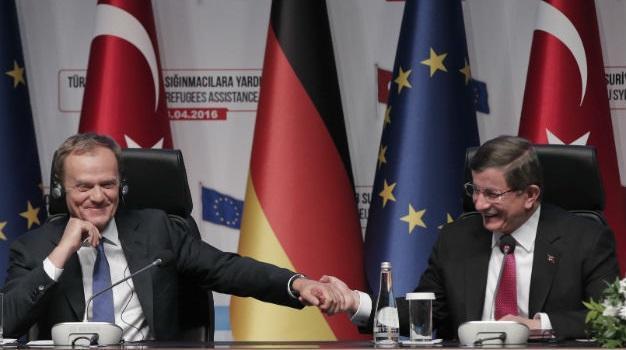Turkey ‘best example’ for refugee treatment
GAZİANTEP

AP photo
European Council President Donald Tusk has praised Turkey’s treatment of refugees, saying “it is the best example for the whole world.”
“Today Turkey is the best example for the whole world for how we should treat refugees,” Tusk said on April 23, during a joint press conference with Turkish Prime Minister Ahmet Davutoğlu and German Chancellor Angela Merkel in the southern province of Gaziantep.
The European leaders were in the Turkish province on the Syrian border for the inauguration of the Turkey-EU Syrian Refugees Assistance Program. They visited the Nizip 2 camp near Gaziantep on the Turkish-Syrian border, where they spoke to some of the 5,000 people, including 1,900 children, who reside in the camp.
“No one has a right to lecture Turkey on what it should do,” Tusk said. “I am really proud that you are my partner and I am absolutely sure that we will succeed… We have no other way!”
Tusk said that since the March agreement between the EU and Turkey “we have seen a sharp reduction of the illegal migration flow across the Aegean Sea.”
The president of the European Council said that beyond the cooperation on the migration crisis, Turkey and the EU had revitalized their relations and agreed on a roadmap to visa liberalization for Turkish citizens.
“The way I see It, Turkey has made good progress ahead of decisions to be taken this summer, provided that Turkey meets all the agreed benchmarks,” Tusk said.
European Commission Vice-President Frans Timmermans also thanked the Turkish people for their commitment to accommodate what he called “an enormous influx of refugees.”
“We as Europeans should state very clearly today here that you are not alone on this,” he said. “Europe is committed to fulfilling the agreements we have reached,” he said, adding that the EU commission was in contact on a day-to-day basis with Turkish authorities to fulfill all elements of the agreement.
“By the end of July, I think we can reach the level of over 1 billion euros [$ 1.12 billion] of projects to ensure a better future for Syrians in Turkey,” Timmermans said.
Meanwhile, Ankara stood its ground over the contentious issue of visa-free travel for its citizens, warning the EU leaders it would stop taking back migrants from Europe if the bloc failed to keep its word.
“The issue of the visa waiver is vital for Turkey,” Davutoğlu said at the press conference.
Under an EU-Turkey deal to ease the refugee crisis facing Europe, EU leaders agreed to cut visa requirements for Turkish citizens and accelerate Turkey’s EU membership bid.
The deal also provides a 6-billion-euro ($6.73 billion) aid package to help Ankara deal with the 2.7 million Syrian refugees it is currently hosting.
It also aims to “share the burden” of the refugee crisis based on a formula of “for every Syrian readmitted by Turkey from the Greek islands, another Syrian will be resettled from Turkey to the EU member states.”
Davutoğlu said the key to tackling the migrant crisis lay in “closer cooperation, and for us part of that closer cooperation is the visa liberalization... Those two go hand in hand.”
Merkel replied she “intends to fulfill the agreement, provided Turkey brings the results” to the table. Ankara must meet 72 conditions to earn the visa waiver and is believed to have fulfilled about half.
Asked what Turkey would do if the EU tried to delay the visa part of the accord, Davutoğlu said Ankara would stop taking back migrants.
“If that were to happen then the readmission agreement will also not enter into force,” he said.
